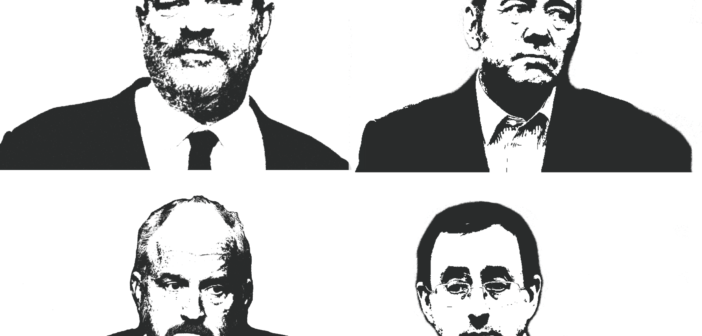Someone needs to get angry.
Dr. Mara Berkland, professor of communication and sociolinguistic studies, surrounded by posters exclaiming “resist” and “no hate is welcome here,” talked about the importance of becoming angry because not enough people are, she said, and it’s time to be.
The #MeToo movement has been surging through Hollywood recently, where directors, actors and the common people are exposing injustice regarding sexual assault and misconduct.
From Harvey Weinstein to Louis C.K. to Kevin Spacey to Larry Nassar, everyday people have been shown example after example of misconduct and are creating their own narratives and their own platforms to talk about these issues.
Lauren Migas, ’18, is working on a research project in which she talks about women’s representation in film and how women in the industry are approaching it now after this movement.
“The industry is pretty bad because women are disrespected and taken advantage of to get in the roles that they want,” Migas said. “If you only see women as prostitutes, or wearing short skirts, or being the supporting role to a man, that’s how you’re going to think in real life.”
According to Migas, the issue of sexual assault and the recent increase in conversation regarding women’s rights in the media is not something she sees diminishing.
So what could the #MeToo movement do to college campuses and students?
According to Berkland, who is also a Title IX officer, she has always been active in the conversation about topics such as sexual assault and domestic violence.
When it comes to students, Berkland says that in order to change the rates at which sexual assault is occurring on college campuses, there needs to be a change in the norms that have led to an amplified rape culture.
“In one of my intro to gender studies classes, we were reading this article where a woman describes her sexual assault,” Berkland said. “A woman in the front row was sitting very nonchalant. She said to me, ‘Dr. Berkland, you just don’t get it. That’s just what happens. Sometimes you go out and party and you have your look on and you have to have sex with people you don’t want to.’ I don’t know how we got there. I do not know how we got there.”
A report from the 2015 Association of American Universities found that over 23 percent of undergraduate females reported experiencing sexual assault or misconduct while in school. Since the college environment is about exploring new things and opportunities, it is at this age we often see an alarming rate of people coming forward with sexual assault reports.
“Hopefully, we will report sexual assault more. I don’t want the numbers to go up more, but I think it will draw the needed attention to it,” Migas said. “In Sweden, they have a high percentage of sexual assault. This is because people report it, not because it happens more.”
According to Berkland, part of what students and even faculty at North Central can do to be more present and impactful in the #MeToo movement is for them to recognize where they are.
“I happen to be a very educated white woman of the upper class. I could easily talk about gender issues from the comfort of my class. But I can’t do that. What we learned from the #MeToo movement is that these white women create a shadow under which women who have less privilege are protected,” Berkland said.
The Women’s March in Naperville on Jan. 21 was scheduled and then subsequently canceled. For Berkland, this was a huge disappointment and a bit worrisome regarding Naperville’s urgency on the matter.
Perhaps the most important parts of the #MeToo Movement is unity and conversation, which are often the foundation of any great social change.
Beyond the barrier of North Central, some campuses are taking the recent #MeToo movement as a way to take action against sexual misconduct in schools. According to “Universities Face #MeToo Movement” by Maria Danilova, vulnerability and change are happening worldwide.
“Brett Sokolow, who heads an association of sexual harassment investigators on campuses, estimates that the number of reported complaints has risen about 10 percent since the accusations against Hollywood mogul Harvey Weinstein surfaced… the increase is mostly from women complaining of harassment by faculty members who are their superiors,” Danilova said.
According to Migas, college campuses need to address the issue of sexual assault and misconduct because it is clearly a huge issue. Colleges could benefit from creating support groups for people suffering from assault, she said.
“I hope the #MeToo movement can become a safety net for people to talk about their experiences,” Migas said. “I think camaraderie is a positive thing from this moment. It isn’t an isolated thing. The phrase “me too” is more together, instead of me or her, it’s us. It makes people feel less alone.”
According to Berkland, her first year at NCC was characterized by sexist comments from her male colleagues, such as calling her a little lady and saying she should be grateful her husband lets her travel. When this discrimination was called out, things began to change.
“Students come in and tell me their experiences with faculty, administrators and classmates; people are finally comfortable talking about it and I hope that moment doesn’t pass,” she said.
While the #MeToo movement surges through society, many may be struggling to keep the movement burning bright. It is no longer a time to show up, but a time to really speak and that is perhaps the greatest role college students can have. “Students need to be loud. They need to show up. They need to show up in droves. They need to speak loudly in their classes. They need to speak loud to friends,” Berkland said.

